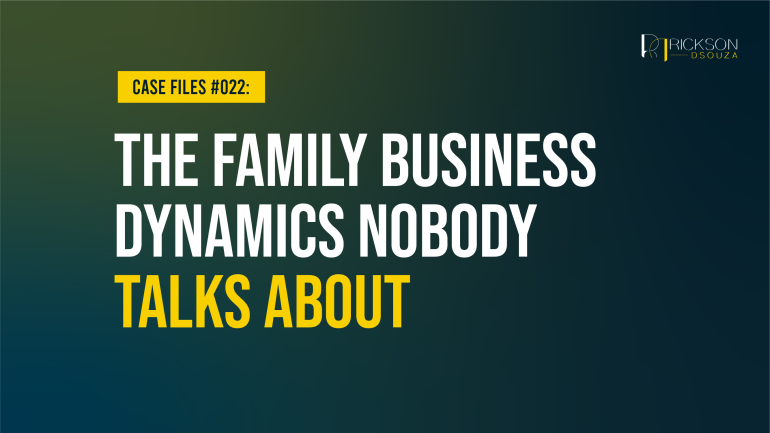Family businesses are complex organizations.
Their complexities go beyond those of a typical corporate. Sure, the usual firefighting does have to happen – people, operations, cash flow, and the rest.
But beyond those typical challenges, there are interpersonal family dynamics amongst involved and active family members. There are business heads (family members) with different personal and professional agendas, all of which need to get balanced to create harmonious growth.
There is typically a family constitution in place for how disagreements are handled, but as much governance as there may be in place – this is family.
It’s not always as easy as sending a memo from the Chairman’s office.
I’m going to share a case with you that brought some of these dynamics to my attention. If you’re part of a family business empire, you might find that these issues are not unique to this family.

Background
My client is one member of a large family business empire here in the UAE. Let’s call the family the Chopras. The Chopras own a diverse line of businesses ranging from infrastructure to health and wellness businesses to Cafe’s.
The patriarch of the family established the first business and started to heavily invest business returns into a property portfolio that grew significantly over time. Today the large joint family (four siblings and their respective family units – spouses and kids) all live entirely off of the rental yields from the family’s property portfolio.
The rental yields exceed the income from their operational businesses now, so I’d go so far as to say the operational businesses are there for the family members to have something to do. They don’t really need the income from these businesses.
The Chopras are also well-invested in the equity market. They’ve got close to US$ 200 million invested in the S&P 500 Index. The returns from this investment fund further real estate investment, which is just growing the pot that funds their lifestyle.
Collectively, all the Chopras draw on perhaps 15% of their total income to fund their lifestyles – and this is by no means a modest lifestyle. They’ve got the mansions, the supercars, the yachts, you name it.
The Matter of Life Insurance
This client is a typical case of ‘Why on earth would they need Life Insurance?’
They’ve got so much liquidity, their investments are secure and growing, and they’ve got a family pot that can fund two generations, maybe even three, without a problem.
When they consider Life Insurance, they do so for the same reasons some of my UHNW entrepreneur clients consider Life Insurance. These reasons.
The Challenge
The Chopras do have some Life Insurance in place. We started with reviewing these structures and quickly discovered that their policies are outdated and at a total cover of US$ 15 million, their Life Insurance structures were way too small to create significant safety nets or cash lifelines for a family of their size and with their financial needs.
Shashank Chopra, who I was in conversation with, was not in charge of the Life Insurance aspect of the family’s estate planning. So after our discussions, he took the matter over to his cousin Dilip who was in charge of these decisions.
His cousin, Dilip, explained that a US$ 15 million policy was ‘too small a problem’ for them to look into right now.
They had other bigger, more pressing matters at hand such as exiting a few lines of business they were involved in, selling some of their commercial properties, and renegotiating some of their credit lines because of the shifts in the current interest rate environment.
I agreed that a poorly structured US$ 15 million Life Insurance policy was too small a problem to warrant their attention right now.
But what we were talking about was a limited-time opportunity to get US$ 150 million of Life Insurance in place. Did that warrant attention?
Shashank thought it did. The challenge? His cousin was still unconvinced.

The Family Dynamics Nobody Talks About
Life Insurance falls outside of the purview of things that Shashank handles for the family business and estate.
While he maybe convinced for many reasons that Life Insurance is a crucial safety net to get in place for the family – he isn’t in the position to take the call.
But does that mean the Chopras let the opportunity slide?
Or is there a clause in the family constitution for how such a decision is handled?
A Life Insurance plan comes with a limited window because tomorrow, factors like age, the passing of time, health, or a change in the family’s financial situation might take the opportunity off the table.
But I doubt Life Insurance is the only matter that warrants this discussion. When a family runs a business and an investment portfolio of that size, there are plenty of investment opportunities, products, and plans that come their way that might or might not be right for them.
So, if the person in charge of that particular area doesn’t necessarily see the need to explore the opportunity, then does the opportunity slide off the table?
I don’t know if getting a US$ 150 million safety net in place is the right move for the Chopras right now – only they can take that call.
I am, however, finding myself questioning: Who does take the ultimate call? Is there room for democracy in these situations? When and to what extent can the rules be bent?
And more importantly, what is at stake if decisions are not viewed objectively, from a 360-perspective, and by more than one individual?
Food for thought, I’d say. What do you think?

